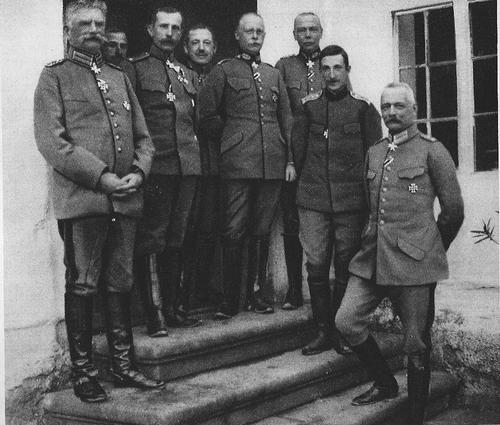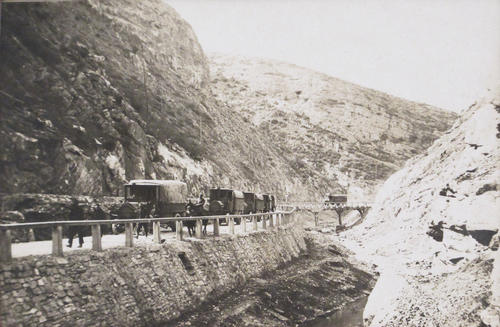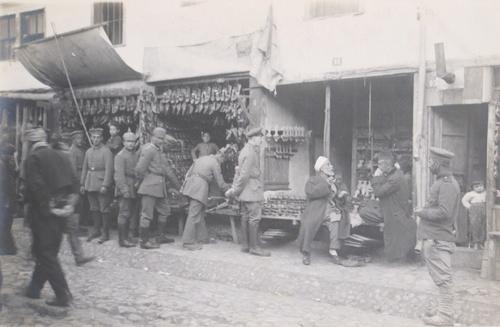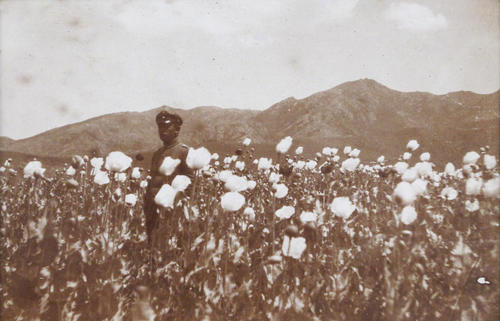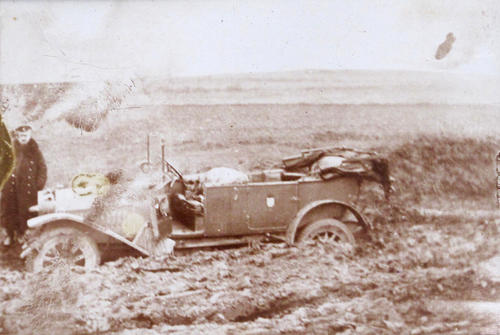"Not a Central European Theatre of War“: The Balkans as a Cultural and Travel Experience in the Notes and Letters of August von Mackensen and Hans von Seeckt 1915-1918
by Deniza Petrova
Meeting in Paraćin, 6. November 1915, from left to right: Erich von Falkenhayn, Crown Prince Boris (of Bulgaria), Hans von Seeckt, Gerhard Tappen, Petǔr Ganchev, Nikola Zhekov, unknown person, August von Mackensen
Image Credit: published in: Der Große Krieg in Bildern (Berlin: Georg Stilke, 1915-1918), Nr. 12, 1915, CC-BY-SA
A Bulgarian war correspondent wrote about military roads and signposts in the Balkans in 1916:
”On tall rods, rammed into the ground, are mounted signs in various languages: Bulgarian, German, Turkish, Russian… They are all brief and yet say a lot – those, who are intimately acquainted with war, which often made them wanderers in foreign lands.” (Yovkov, Krǔstopǔt [Crossroads], p. 497)
Many of the ”wanderer“ wrote their “travel experiences” down. While simple soldiers described their impressions of foreign lands and peoples primarily on field postcards and in letters to their families, higher officers had, far more, the opportunity and entitlement to record their observations in diaries, notes and extensive correspondence, which were, later, often accessible to the public as part of their memoirs.
German officers – Helmuth von Moltke and Colmar von der Goltz were among the most prominent - had already relayed an image of the Balkans and their markedly ethnically mixed population to the German public decades before World War I. In their writings, Oriental exoticism and primitive backwardness above all were attributed to the region as main features. With the First World War, the stereotype of the allies (Bulgaria, the Ottoman Empire) and the enemies (Serbia, Romania) of the Balkans changed, if only for a short time and superficially. The views that had already been consolidated, however, continued to be virulent.
The following article is devoted to the Balkans as a cultural and travel experience in textual excerpts penned by August von Mackensen and Hans von Seeckt that came into being between 1915 and 1918 during the campaigns of the Central Powers against Serbia and Romania. Mackensen occupied the high command in the Balkans, with Seeckt as his chief of staff. Both of them gathered experiences and impressions on their official trips, which they passed on in multifaceted illustrations of the landscape and population. The texts of both authors were shaped, nevertheless, by the spirit of the time. However, there are clear differences between them in style, potential for differentiation and clarity of observation. While August von Mackensen adapted or even derived his observations from the then current paradigm of the “wild Orient”, Seeckt’s narratives bear witness to the cultural competence he acquired on his numerous prolonged journeys to Algeria, Egypt and India, among other places, and exhibit numerous forms of intertextual relation. Mackensen gained travel experience chiefly in the entourage of Wilhelm II during the emperor’s journey to the Orient, and rather superficial impressions from short visits to Constantinople, Jerusalem and Damascus in autumn 1898.
This article combines the process in literary history of source and influence research with the question of the cultural-historical roots of the view of the Balkans and the imprinting of the authors by their military background, to make clear how the interplay of these factors shaped the gaze of the traveler and herewith the “travel report”. The literary model of travel or wandering proves itself suitable for making the in fact indescribable war experience experienceable or narratable, stated Charlotte Heimel in her literary studies dissertation, published in 2007. The textual excerpts are taken from the private correspondence of Seeckt and the wartime notes of Mackensen, in order to reveal points of intersection and divergences in the perception of the Balkans as a space of culture and war, and at the same time touch on the contrast between the officially and privately shaped views of the region. At the same time, it must be mentioned that in the case of both authors, personal and occupational discourses depend on and permeate each other.
Impressions of the Balkans
From the pen of Hans von Seeckt originate some of the arguably most literarily valuable travel impressions from a military officer of the Balkans, especially of Bulgaria and Macedonia. Between October 1915 and June 1916, Seeckt travelled to the interior and along the front line as Mackensen’s chief of staff many times. In his letters from this time to his wife, Dorothee von Seeckt, are to be found passages that resemble literary skits, and personal impressions of the places and landscapes visited, which relay their history and cultural peculiarities. Even if the language, which time and time again avoids the military, and the characteristic style of his letters are accounted for by the goal of the entertainment of the private auditorium, they allow insight into the interest horizon of the writer himself and reveal an appreciation of the culture of the Orient. At the beginning of the Serbian campaign, Seeckt, who discovered “wonderful old Serbian churches and cloisters” on an exploratory trip along the Danube, noted regretfully:
”It’s a pity that I do not have more time for this ancient culture of the Christian world of the East.” (Seeckt, Aus meinem Leben, p. 227)
On the same occasion, Mackensen expressed himself unemotionally: ”I am only surprised that they [the Serbs] have not yet shot the church towers which we perpetually occupy with observation posts into dust.” (Mackensen. Briefe und Aufzeichnungen, pp. 220-221)
After the taking of Belgrade, Mackensen formulated the reasons for his visit to the fortifications a little more sophisticatedly:
”The visit to the old fortification interested me because of its great past alone. I also wanted, however, to convince myself of the indeed tremendous force of our artillery.“ (Mackensen. Briefe und Aufzeichnungen, p. 224)
At the beginning of February 1916, after the end of the Serbian campaign, August von Mackensen relocated his headquarters to Skopje, the present-day Macedonian capital. He held command over the German and Bulgarian troops on the Macedonian front until August 1916. In the description of Skopje, his predispositions can be clearly observed. While these are due to earlier travel experiences and personal impressions in the case of Seeckt, a more negative manifestation of stereotypical thinking is hinted at in Mackensen. The mood that arose from the effect of beautiful landscapes differed likewise. Seeckt’s almost reflective-poetic note contrasts with Mackensen’s enthusiasm for the imposing and powerful.
|
Seeckt |
Mackensen |
|
”Usküb, which you can also call Skoplje or Skopja, depending on whether you want to speak Turkish, Serbian or Bulgarian. […] Mountains that rise up to over 1000 metres lie close to the city, behind them such that reach 2500 metres and are bare and colourful. Character of the south Italian coast and all the same different. Little snow, even on the highest peaks. Perhaps a dozen white minarets. The city is for the most part Turkish and on the street quite a swarm of the most various types, also the so well-known donkeys and horses from the Orient.“ (Seeckt, Aus meinem Leben, p. 328) ”A day of soft beauty, too beautiful for this time and world. Soft wonderful colours on the mountains. Yearning-filled air and pearl-coloured brilliance…“ (Seeckt, Aus meinem Leben, p. 328) ”This Macedonian spring is strangely unreal, so frailly delicate. Only the box tree, which overruns the hillsides, is abundant here and spreads, from its little yellowish flowers, which are wholly unknown to me, a sweet fragrance. On the edge of a brook stood luminous cowslips and a few small violets […]. We climbed through an Albanian village with colourful and very pretty male and deeply hidden female inhabitants into a valley, in whose entrance a cloister lay […] downward to a gorge, through which only the roaring river forced itself. The track is relegated to high over the steep slope, with it bright blue sky […] As noise the clatter of a […] simple little mule – completely different from in the Black Forest…“ (Seeckt, Aus meinem Leben, p. 356) |
”Yesterday the customary weekly market day took place. The swarm of people and animals in the city didn’t yield anything to Potsdamer Platz in Berlin. The commerce, however, unwound with the serenity of the Oriental. The ox acts as a draught animal, the donkey plays the leading role as a beast of burden. […] The garb of the men approximates that of the women in variegation of colour, appeals, however, especially because of its diversity. […] All the tribes of the Balkan peninsula meet here and create thereby a continuously changing sight. And amongst them now even Bulgarian, Austrian and German soldiers! The whole city is a big army camp […]. All the craftsmen work in their workshops, which are open to the street, all shops, in which the most sumptuous pieces of embroidery, weapons, carpets, gold work and so forth are offered for sale, are open. But what dirt, what scoundrels one sees, and what to us unknown living habits! […] Fortunately, I live considerably beyond the city.“ (Mackensen. Briefe und Aufzeichnungen, pp. 262-263) ”The landscape remains, for me, the most appealing thing. The sight of the mountains lined with snow around the basin of Skopje and, in particular, the enormous pyramid of Ljubostin, is counted among the most impressive that I have encountered in Serbia and the Carpathians. As beautiful, that is, as regularly formed pyramids, fully clothed in snow, the enormous mountain stands out against the blue sky, in which it rises up sublimely above its complete surroundings.“ (Mackensen. Briefe und Aufzeichnungen, p. 263) |
The Seecktian writing style is characterised by a pronounced feel for detail as well as observational skills and the ability to bring together knowledge and experience into a multifaceted image. In the course of this, his steady mental predispositions and impressions from his earlier travels in the European south and the Orient are expressed. Thus, the comparison of the Macedonian mountain and city landscape with Italy frequently comes up:
”The small town lies in an Italian manner on a hill close to a lake, from which we had, at table, fish and crustraceans. […] snow lay in the mountains, so it became a quintessential winter trip. The pass, which is at a height of 1200 metres, was just possible to get over in the car […]. The mountains look, naturally, even more magnificent than usual in snow and are reminiscent of the Dolomites. The weather conditions were clear and the eagles hovered in the pure mountain air. We then went downhill […] into a broad high valley as far as the destination, the city Monastir (Bitolj) […]. The city prosperous and well situated.“ (Seeckt, Aus meinem Leben, pp. 331-332)
”It was simply glorious, after a rainy day, golden and gilded light, as only the south has. The mountains in a light green veil, the villages enveloped in white blossoms, the slender poplars […] in the first most delicate green and above all, the luminous snow chains.“ (Seeckt, Aus meinem Leben, p. 358)
Biblical and Oriental motifs also pervade Seeckt’s “Impressions”, which are not completely devoid of humour:
”The large herds of sheep with the multitude of small, clumsy, mostly only day-old lambs in old Bulgaria were sweet. The image of the good shepherd, who grazes his lambs with care, came to my mind so often when I saw how he carried the tender small thing in his arms. […] In addition, the scenic background reminiscent of old paintings, the southern light, clothes and cut of the faces. One can also see the holy family on the journey; even the ox and donkey are not missing…“ (Seeckt, Aus meinem Leben, pp. 354-355)
Seeckt demonstrated recurrent interest in cultural customs, particularities, and influences in culture and architecture in the Balkans and connected his description of the area, which was unknown to his wife, with their common travel memories:
”Yesterday, I climbed […] up to a small mountain graveyard with a chapel, from which there was a magnificent view. In this area, they bury their dead in large stone sarcophagi that are very roughly hewn and stand above the ground […] The Mohammedan buries in the earth and places the well-known stone with a turban or a fez […] Such graves are, indeed, known to us […] from India.“ (Seeckt, Aus meinem Leben, p. 355); “I drove to two ancient mosques today at noon; at one, I found a […] tomb from very ancient times with Persian motifs, traces of blue majolica.” (Seeckt, Aus meinem Leben, p. 362); “This afternoon, I viewed an interesting Oriental church, with a really marvellous imitation iconostasis carved from wood. In its kind perhaps completely unique. Reminiscent in its carving of the Indian, big surfaces and whole columns with tendrils freely flying up and Biblical representations from one piece. The church is difficult to find, it lies half-underground, probably to humble itself during the Turkish reign… On the citadel, we then had a wonderful view over the city and valley […]” (Seeckt, Aus meinem Leben, p. 357)
August von Mackensen’s notes are clearly different in characteristic style, because the intention of the text was different in his case. He did indeed capture, like Seeckt, impressions of the country and people, but did this from the perspective of a military leader, who had concrete tasks to complete and was soberly and goal-orientedly interested in militarily relevant factors like the state of infrastructure, the mood of the population, and the resources of the country. “The Balkans were completely unknown to me as far as my own experience, I knew its inhabitants, their culture and the economic conditions, too, only from reports,” wrote Mackensen in a review drafted after the war (Mackensen. Briefe und Aufzeichnungen, p. 217).
He was certainly not unbiased, as these reports had been shaped by a certain horizon of expectation. Mackensen felt, initially, vindicated in his view of a backwards region by the conditions in the Balkans, which conformed to the polarity West=order versus Orient=chaos. The troop leader was involved not only with politics, “[…] but also with mountains, that do not exist on the map, and with paths, that are indeed on it, but do not exist in reality” (Mackensen. Briefe und Aufzeichnungen, p. 217). Mackensen had to take the unfavourable conditions, which constituted a significant cause for the slowed movement of troops, into account:
”Mountains and paths slow them down. One can only imagine the overland routes when one has seen them and is forced to use them. The whole country is wet clay soil. If rain is added to this, then half of Serbia is underwater, and one does not walk in the mountains, but slides […]. There is no trace of Chausseen in our sense of the word.“ (Mackensen. Briefe und Aufzeichnungen, p. 238); “The paths would be declared unusable in peace, at least for the movement of troops. One has to have seen them, to be able to imagine the sludge, holes and debris. Even the state in the city streets would be deemed impossible in Germany.” (Mackensen. Briefe und Aufzeichnungen, p. 240)
Mackensen, a trained agriculturalist, frequently and competently noted down details about the climate, weather conditions, soil composition, and crop yields in the occupied territories. His general impression, at least in Serbia and Macedonia, remained, all the same, one of an inhospitable, threatening, alien world, in which “unimaginably” chaotic conditions prevailed. “The Balkans are, concerning traffic conditions and many other things, not a Central European theatre of war”, Mackensen summed up with resignation (Mackensen. Briefe und Aufzeichnungen, p. 252).
The Coalition War and (Lack of) Military Culture
Seeckt and Mackensen found themselves confronted with the demands of the coalition war. The experience from the joint operation with the Austro-Hungarian military in Galicia was augmented by a not insignificant “diplomatic” component. To Mackensen’s and Seeckt’s spectrum of tasks were added, until the end of the war, in addition to purely military tasks, administratory, advisory and investigatory ones, when Mackensen presided over the military administration in Romania until the end of the war and Seeckt, from December 1917, acted as chief of the Ottoman general staff.
The East and concretely the Balkans, with their heterogeneous military cultures, opened new (official, too) perspectives for the German soldiers and increased, at the same time, the demand for cultural competence and diplomatic skill in intercourse with the allies. The role of the German military advisors, military attachés and liaison officers in the Balkans (and especially in the Ottoman Empire) was richer by many aspects than their role on the battlefields of the Western Front. For example, they maintained relationships with the political elites of the respective country and with local dignitaries, had to take over the representation of German political and economic interests in occupied territories or even, in the case of Mackensen, appear symbolically as a figurehead of cohesion in the military coalition of the Central Powers. These often inherently opposed functions shaped both their perception of themselves as well as the image of them that emerged among their allies and enemies. August von Mackensen rose, in 1916, to be the most popular general of the Central Powers in the campaign against Romania, admired by the Bulgarian troops and feared by the Romanians. The attempt to impress the allies by, for instance, the greeting of the Bulgarian troops in Bulgarian at parades or the appearance of Mackensen in his hussar uniform with all the insignia of his rank, had the desired effect.
Their own ideas of ”friend“ and ”foe“ also underwent a transformation. During the Serbian campaign in 1915, Mackensen referred to the Bulgarians as “Prussians of the Balkans”, however, in the first few months of the Romanian campaign in 1916/17, he was prepared to swap “a kingdom for a German division” (Mackensen. Briefe und Aufzeichnungen, p. 288). In a letter to Falkenhayn, Seeckt describes the Bulgarian General Konstantin Jostow, probably influenced by rumours about the supposed Russophilia of the Bulgarian, as “the creator of daily small and tiny obstacles as well as major delays…” (Seeckt, Aus meinem Leben, pp. 308-309). At the beginning of the joint collaboration he saw “no partisan for our cause” in Jostow, who was, however, later promoted to “my colleague Jostow”:
„We suit each other superbly, since we quarrelled and he overcame his mistrust.“ (Seeckt, Aus meinem Leben, pp. 332-333)
The misunderstandings were largely due to the fact that the Bulgarian government, the Commander-in-Chief Nikola Žekov, and the Bulgarian King Ferdinand entered into commitments and were prepared to make concessions to the allies that, generally speaking, did not conform with the military and economic capabilities of the country or were impossible to adhere to because of flaws in logistics and shortages in the supply of ammunition. The Chief of Staff Jostow, a pupil of the Vienna k.u.k. Kriegsschule, had to look for a militarily practicable way forward and thus ensured there was potential for conflict. He often wrote in his diary, with indignation, about the “unteachable Orientals” in the Bulgarian political and military elite.
Seeckt humorously depicts the international composition of his staff and the resulting challenges, not only linguistic in nature:
”You can see how varied my work is from the fact that apart from my three German [general staff officers], there is in addition an Austrian, a Bulgarian and a Turkish general staff officer in my small staff... Our commands to the Bulgarian army naturally need to first be translated. The Austrians have become used to my German!” (Seeckt, Aus meinem Leben, p. 256)
In addition to the language difficulties, a drawback of the Bulgarian soldiers was the, from a German perspective, lack of bearing and discipline. The Bulgarian was “warlike, [but] not actually military in our sense”, as Seeckt noted in March 1916, although it proved to be “the most military of the Balkan armies” (Seeckt, Aus meinem Leben, p 375). The “military” was completely absent in the eyes of Seeckt and Mackensen, but also in eyes of other German participants in the war who came in contact with irregular troops in the Balkans. Using the example of the Bulgarian “Komitadschi”, the term guerilla fighter falls in the case of both observations, whereby Seeckt also points out the flowing borders between combatants and non-combatants in the ethnically strongly split region and touches on the handling of the civil population that interfered in the fight by his own soldiers.
|
Seeckt |
Mackensen |
|
”A lot of Bulgarian soliders, who in part make a very good impression. They salute properly and are also properly clothed. But among them there are also appearances at the Landsturm that are reminiscent of a brigand opera. One calls them Komitadschi and associates this with the idea of a man, for whom it is not important, with whom he fights, if he can only fight and do everything else that is associated with it…“ (Seeckt, Aus meinem Leben, pp. 299-300 ) ”Friendly reception, where there are Romanian or Macedonian people; struggles and flight, where there are Serbs. Our people, too, certainly do not treat them in a friendly manner, when the inhabitants take part in the combat. This kind of people’s war is not pleasant…“ (Seeckt, Aus meinem Leben, pp. 254-255) |
“The area at the train station was a big military camp of troops of all weapons, […] Germans, Austrians and Bulgarians muddled, even Russians and Serbs as workers. Among the Bulgarian Komitatschis are figures that I would not like to meet in a lonely street. They […] could have stood as models for Trenck's Pandurs.“ (Mackensen. Briefe und Aufzeichnungen, p. 249) |
The introduction to the ”military“ had a educating-civilising effect on the ”primitive“ farming people of Bulgaria, whose political elite could only be called its (too) soon matured “outgrowth”, as is evident from Mackensen’s exposition about the qualities and mission of the Bulgarian Tsar, who was of German descent:
“It may not always have been easy for the highly educated, sensitive and farsighted ruler to accept the customs, mistrust and primitive narrowness of the Bulgarian peasantry and its political hothouse plants of Sofia, but he had become an educator of his people. The Officer School in Sofia was one of his instruments for this.“ (Mackensen. Briefe und Aufzeichnungen, p. 250)
From the point of view of Mackensen and other German officers on the conditions in the Balkans, the military was deemed to be a synonym for order, culture, civilization; opposed to this was the stereotype of the “warlike” and “primitive”, which stood for asymmetry, violent encroachments, chaos and lack of culture.
Conclusion
Mackensen’s and Seeck’s view of the Balkan theatre of war, the coalition war, the allies, the local population and finally also the (war) landscape was shaped by multiple factors. Thus, Seeckt’s interest in ancient literature, art and philosophy as well as his earlier travel experiences in the European south, Egypt and India played a role. The private character of his correspondence necessitated the intent to entertain of the letters, the captured impressions purely expressed the personal perception of the foreign. In this way, he tried to escape the one-sided view induced by the war:
”I just cannot get out of the habit of beholding land and people and viewing these as a product of nature and of trying to see not only battlefields in mountains and expanses, but also a piece of world’s beauty.“ (Seeckt, Aus meinem Leben, p. 230)
Nevertheless, he was aware that the war brought together these “here so involuntarily converging worlds” (Seeckt, Aus meinem Leben, p. 141), the involuntary stands, here, at the same time succinct and telling, for the dark side of the (war) travel experience. Orientation was provided for both authors through expectations and predispositions that were not always connected to their own immediate lived experience. Thus emerge, in Mackensen, views that were formed and solidified long before the war, that, according to his account, were taken from reports he read, and that he connected to the contemporary friend-foe opposition in the Balkans, for example when he compared the Romanians and the Bulgarians:
”They have very little in common as people, have very different characteristics […]. Morally, the Bulgarian is far above the Romanian. But these have progressed further culturally. The Romanian is for appearance, the Bulgarian for being. The Europeanisation of the former is therefore more external, in the case of the Bulgarians only beginning, but seeking the basis. The Romanian has Parisian passions, the Bulgarian German [ones].“ (Mackensen. Briefe und Aufzeichnungen, p. 324)
For both writers, however, the foreign-own opposition, which underlay both Mackensen’s and Seeckt’s impressions, was constantly present. In the end, on the (war) trip, one yearned finally for return: “Someone said recently, we would all long for the beauty of this country again. […] not I, I would long for sand and pines […]” (Seeckt, Aus meinem Leben, p. 362).
Sources
- Goltz, Colmar von der: Ein Ausflug nach Macedonien: Besuch der deutschen Eisenbahn von Salonik nach Monastir, Berlin 1894.
- Intimnite prichini za pogromite na Bǔlgariya. Spomeni na general Sava Savov i general Konstantin Zhostov, ed. by Tsocho Bilyarski, Sofia 2000.
- Moltke, Helmuth von: Unter dem Halbmond. Erlebnisse in der alten Türkei 1835 – 1839, Berlin 1841.
- [Mackensen, August von:] Mackensen. Briefe und Aufzeichnungen des Generalfeldmarschalls aus Krieg und Frieden, ed. by Wolfgang Förster, Leipzig 1938.
- [Seeckt, Hans von:] Hans von Seeckt. Aus meinem Leben 1866-1917. Unter Verwendung des schriftlichen Nachlasses hrsg. von Friedrich von Rabenau, Leipzig 1938.
- Yovkov, Yordan: Krǔstopǔt [Crossroads], in: Yordan Yovkov. Sǔbrani sǔchineniya. Vol. 1., Sofia 1976, pp. 496- 497.
Bibliography
- Gahlen, Gundula: Erfahrungshorizonte deutscher Kriegsteilnehmer im Rumänienfeldzug 1916/17, in: Am Rande Europas? Der Balkan - Raum und Bevölkerung als Wirkungsfelder militärischer Gewalt, eds. Bernhard Chiari and Gerhard P. Groß, München 2009, pp. 137-158.
- Georgiev, Georgi: Edin ot Pǔrva diviziya. Spomeni na uchastnik, Sofia 1935.
- Heimel, Charlotte: Touristen an der Front. Das Kriegserlebnis 1914-1918 als Reiseerfahrung in zeitgenössischen Reiseberichten, Münster 2007.
- Minkov, Stefan: Ferdinand I, Tsar of Bulgaria, in: 1914-1918-online. International Encyclopedia of the First World War, ed. by Ute Daniel, Peter Gatrell, Oliver Janz, Heather Jones, Jennifer Keene, Alan Kramer, and Bill Nasson, issued by Freie Universität Berlin, Berlin 2014-10-08. DOI: http://dx.doi.org/10.15463/ie1418.10319.
- Paraskevov, Vasil: Radoslavov, Vasil, in: 1914-1918-online. International Encyclopedia of the First World War, ed. by Ute Daniel, Peter Gatrell, Oliver Janz, Heather Jones, Jennifer Keene, Alan Kramer, and Bill Nasson, issued by Freie Universität Berlin, Berlin 2014-10-08. DOI: http://dx.doi.org/10.15463/ie1418.10155.
- Petrova, Deniza: Zhekov, Nikola, in: 1914-1918-online. International Encyclopedia of the First World War, ed. by Ute Daniel, Peter Gatrell, Oliver Janz, Heather Jones, Jennifer Keene, Alan Kramer, and Bill Nasson, issued by Freie Universität Berlin, Berlin 2014-10-08. DOI: http://dx.doi.org/10.15463/ie1418.10095.
- Schwarzmüller, Theo: Zwischen Kaiser und „Führer“. Generalfeldmarschall August von Mackensen. Eine politische Biografie, Paderborn 1995.
- Stein, Oliver: „Wer das nicht mitgemacht hat, glaubt es nicht.“ Erfahrungen deutscher Offiziere mit den bulgarischen Verbündeten 1915-1918, in: Der Erste Weltkrieg auf dem Balkan, eds. Jürgen Angelow, Gundula Gahlen and Oliver Stein, Berlin 2011, pp. 271-287.
- Stein, Oliver: Zwischen Orient, Russland und Europa. Zum Bild der Bulgaren und ihres Militärs in der deutschen Presse 1912-1918, in: Am Rande Europas? Der Balkan - Raum und Bevölkerung als Wirkungsfelder militärischer Gewalt, eds. Bernhard Chiari and Gerhard P. Groß, München 2009, pp. 159-175.
Citation
Petrova, Deniza: „Not a Central European Theatre of War“: The Balkans as a Cultural and Travel Experience in the Notes and Letters of August von Mackensen and Hans von Seeckt 1915-1918 (2015), URL: http://www.mwme.eu/essays/index.html
---
---
Translated by Brier Field (Freie Universität Berlin)
---
Deniza Petrova, M.A. (Freie Universität Berlin)
Mrs. Petrova is writing a dissertation at the Freie Universität Berlin. She researches the Bulgarian memory culture surrounding the First World War through the example of the Tutrakan fortress.
